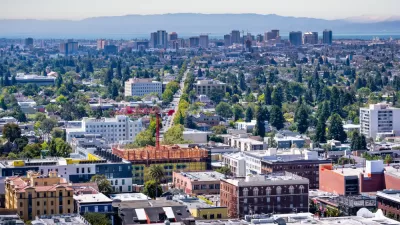The parking reform movement has a major new feather in its cap: the Toronto City Council has this week adopted sweeping changes to the parking requirements of the city's zoning bylaws.

The Toronto City Council this week adopted Zoning Bylaw Amendments that will remove most minimum parking requirements for new developments, according to a press release published by the city of Toronto. Parking maximums have also been added.
The city reports that the changes to the city's parking requirements align with goals set by its climate action strategy, TransformTO, approved in 2017, and the Provincial Policy Statement and the Growth Plan, adopted in 2019.
An article by Erin Nicole Davis for Storeys provides more details about the expected impact of the drastic parking reforms adopted by the fourth-most-populous city in North America.
Part of the reasoning behind the reforms is a pattern of overbuilt parking in new residential developments. According to Davis, "The Residential Construction Council of Ontario (RESCON) says data shows that in new condo projects, an average of 33% of parking stalls were left unsold. One builder, according to RESCON, had 90% still available for sale as a building neared construction."
RESCON also estimates that the price of building a parking spot has increased dramatically in recent years—from $80,000 to $165,000 in three years.
Planetizen shared news that Toronto was heading toward a historic moment in parking reform in November, but Toronto announced the potential for parking reforms [paywall] back in February.
Toronto becomes the latest city to roll back parking requirements in 2021, joining San Diego, Boston, Denver, Minneapolis, and Berkeley—although Toronto's reforms are far more universal than many, but not all, of the cities on that list. Planners in Raleigh, St. Paul, and Dallas are also working on parking reforms, and could have legislation for approval relatively soon.
There's also a crowd sourced map of all the cities that have adopted parking reforms.
FULL STORY: Toronto Removes Parking Minimums for New Residential Developments

Alabama: Trump Terminates Settlements for Black Communities Harmed By Raw Sewage
Trump deemed the landmark civil rights agreement “illegal DEI and environmental justice policy.”

Planetizen Federal Action Tracker
A weekly monitor of how Trump’s orders and actions are impacting planners and planning in America.

Why Should We Subsidize Public Transportation?
Many public transit agencies face financial stress due to rising costs, declining fare revenue, and declining subsidies. Transit advocates must provide a strong business case for increasing public transit funding.

Understanding Road Diets
An explainer from Momentum highlights the advantages of reducing vehicle lanes in favor of more bike, transit, and pedestrian infrastructure.

New California Law Regulates Warehouse Pollution
A new law tightens building and emissions regulations for large distribution warehouses to mitigate air pollution and traffic in surrounding communities.

Phoenix Announces Opening Date for Light Rail Extension
The South Central extension will connect South Phoenix to downtown and other major hubs starting on June 7.
Urban Design for Planners 1: Software Tools
This six-course series explores essential urban design concepts using open source software and equips planners with the tools they need to participate fully in the urban design process.
Planning for Universal Design
Learn the tools for implementing Universal Design in planning regulations.
Caltrans
Smith Gee Studio
Institute for Housing and Urban Development Studies (IHS)
City of Grandview
Harvard GSD Executive Education
Toledo-Lucas County Plan Commissions
Salt Lake City
NYU Wagner Graduate School of Public Service





























